
by pestcontrolseos | Feb 10, 2025 | Blog, Pest Info & Articles
Termites. The mere mention of the word can send shivers down a homeowner’s spine, especially in Southern California, where these wood-devouring pests thrive. Protecting your home from termites is easier said than done. It’s an ongoing problem that costs homeowners in the United States billions in damages and repairs every year. The worst part is that infestations often go unnoticed until substantial damage has occurred.
Many signs of termite infestations are subtle and easily overlooked. By the time most property owners call in an expert for an inspection, it’ll be too late.
This guide will equip you with the knowledge to identify hidden indicators of termite infestations, enabling you to take swift action and safeguard your property.
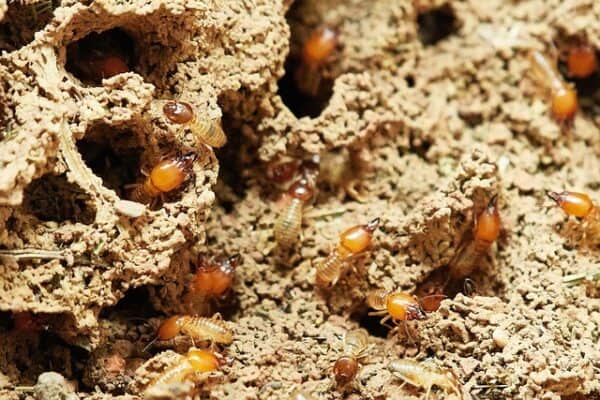
Why Early Detection is Crucial in South California
Southern California’s warm climate creates an ideal breeding ground for termites, allowing colonies to flourish year-round. Undetected termite activity can lead to significant structural damage, compromising the integrity of your home and resulting in costly repairs
Early detection is critical to minimize damage and prevent extensive infestations. Regular inspections and awareness of subtle warning signs are your best defense.
Subtle Termite Infestation Signs Most Overlook
Termites are masters of disguise, often working from the inside out, making their presence difficult to detect.
Here are some subtle signs that Southern California homeowners frequently miss:
-
- Discarded wings: After swarmers (winged termites) meta and establish new colonies, they shed their wings. Finding piles of these discarded wings, which resemble fish scales, near windowsills, doors, or cobwebs indicates termite activity in the vicinity.
- Subtle Drywall Damage: Termites consume cellulose, a primary component of paper found in drywall. As they tunnel through drywall, they may create small pinholes, often capped with a speck of dirt. Additionally, keep an eye out for bubbling or peeling paint that mimics water damage, as this can also signify termite presence.
- Sticking Windows or Doors: Warping or buckling of wood due to termite damage can cause windows and doors to become difficult to open or close. This is because termites produce moisture and heat as they feed, contributing to the distortion of wooden frames.
- Unexplained Moldy Odors: Termites thrive in environments with high moisture levels. A persistent musty or moldy smell, without an apparent source, could suggest termite activity, as they create conditions conducive to mold growth.
- Hollow Sounds: When termites consume wood from the inside out, it often leaves them hollow. Tapping on wood to check for hollow sounds indicates termite damage beneath the surface.
Mud Tubes: A More Obvious, Yet Sometimes Missed, Sign
Subterranean termites, a common type in Southern California, construct mud tubes to travel between their colony and food sources. These tubes, made of saliva, mud, and feces, provide a protected environment for termites to access wood without exposure to the open air. Check your foundation, crawl spaces, and any areas where wood comes into contact with the soil for these pencil-sized channels.
The Importance of Getting Regular Termite Inspections
Awareness is helpful. Professional termite inspections are better.
Here’s why professional inspections are invaluable:
- Trained inspectors possess in-depth knowledge of termite behavior, nesting habits, and the subtle signs of infestation that homeowners often overlook.
- Professionals use advanced tools, such as moisture meters and thermal imaging cameras, to detect hidden termite activity and assess the extent of the damage.
- Inspectors can identify the specific type of termite infesting your property, which is crucial for determining the most effective treatment strategy.
How Termite Control Can Solve Your Termite Problem
Termite control can eliminate termites and protect your home by doing the following:
- Detailed inspections to identify termite infestations, assess damage, and determine the type of termites present.
- When termites have spread throughout a structure, fumigation is used to eliminate termites completely, reaching areas that other treatments cannot.
- Termite damage repair, including replacing damaged wood, to restore the structural integrity of your home.
Dr. Termites, in particular, uses Termidor, known as “America’s #1 termite defense,” a liquid treatment applied either around the perimeter of your home or directly to termite-infested areas.
In addition to regular inspections and professional treatment, you can take steps to minimize the risk of termite infestations by repairing leaky faucets and pipes, clearing away any wood debris from around your property, and scheduling routine inspections, especially if you live in an area with a high termite population, which is pretty much most of South California.
Don’t Wait Until It’s Too Late
Termite infestations can cause extensive damage to your home. But this is all preventable.
By staying informed, being vigilant, and partnering with a trusted pest control provider like Dr. Termites, you can safeguard your property from these destructive pests.
Stop ignoring the subtle signs. Protect your home by being aware of the signs of termite infestations and getting ahead of these destructive pests.
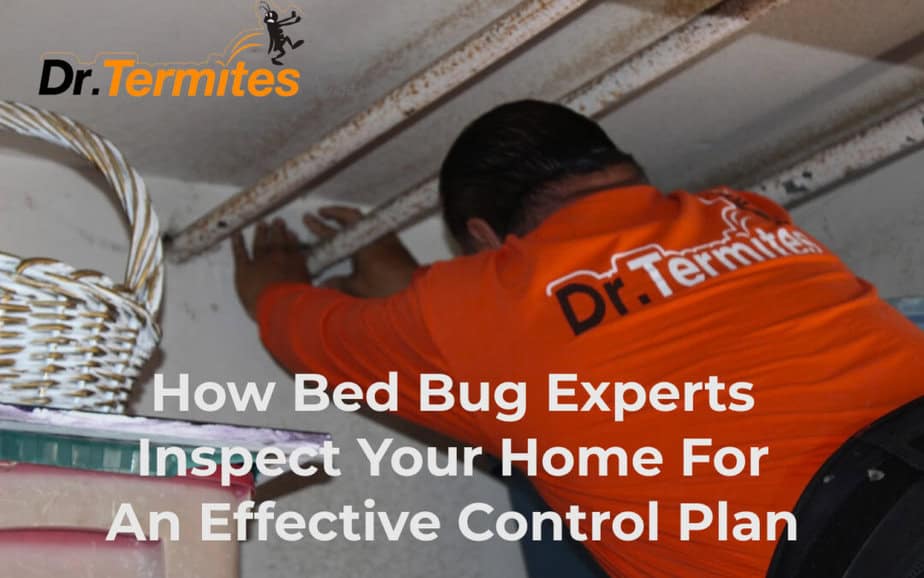
by pestcontrolseos | Jan 22, 2025 | Blog, Pest Info & Articles
Finding out your house could have bed bugs makes one easily overwhelmed. The idea of these bugs invading your sensitive area makes one nervous. On a comprehensive bed bug control examination, nevertheless, an expert specialist may assist to create a clear strategy for removal. Experts in bed bugs analyze your house methodically to make sure no area is neglected. This inspection aims to not only find bed bugs but also create a plan fit for your particular circumstances. This blog guides you through what a professional performs while looking over your house.

Initial Assessment and Consultation
Communication with Homeowner
A specialist will discuss your issues with you prior to starting the inspection. They will probe to better know your experience with any bed bug encounters. You may be asked when and where have you seen bites, odd marks, or any physical proof of bed bugs. The more information you can provide, the easier it will be to plan the bed bug control inspection.
Visual Inspection
The specialist begins by visually looking over places like the bedroom where bed bugs are most likely to hide. Since these are the ideal places for bed bugs to flourish, areas close to your bed or where others lay get most attention. The specialist will check:
- Mattresses: Bed bugs often reside around labels, cracks, and within seams.
- Bed frames and headboards: Particularly close to gaps or joints, these are popular hiding places for bed bugs.
- Furniture: Around here might possibly be contaminated sofas, chairs, and other pieces.
Examining these places closely helps the professional search for any obvious bed bugs or droppings. Among these indicators can be molted skins, black feces, or blood patches.
Tools and Techniques for Detection
Bed Bug Detection Devices
Apart from the visual examination, professionals might use certain instruments to improve the bed bug control inspection. A flashlight is a typical instrument for looking at dark corners and cracks where bed bugs could be lurking. A magnifying glass is another handy instrument for seeing little eggs or bed bug larvae invisible to the unaided sight.
Certain experts also make use of bed bug detecting canines, trained to scent these invaders. Even in places people would overlook, dogs have an amazing capacity to detect bed bugs. In bigger houses or flats where bed bugs might be lurking in many areas, this method can be extremely useful.
Heat and Carbon Dioxide Sensors
Under some circumstances, bed bug specialists could make use of sophisticated tools as carbon dioxide monitors or heat sensors. Heat and carbon dioxide attract bed bugs, hence professionals may utilize these instruments to find hotspots that would point to an infestation. These techniques are particularly good for spotting bed bugs in difficult-to-reach areas.
Areas of Focus During the Bed Bug Control Inspection
Bedroom and Sleeping Areas
The bedroom comes first as bed bugs usually gather in sleeping quarters. An expert will examine closely beneath the bed, under the bed frame, and along the flooring. They will also look beneath carpets in the bedroom, in closets and drawers.
Living Rooms and Common Spaces
Although bed bugs like to live near their food source—you—they may potentially contaminate other parts of the home. A specialist will go over the living area, particularly with regard to sofas and chairs, where bed bugs may be lurking. They will also search these spaces for any indicators of activity.
Other Potential Hiding Places
Professionals also search other likely hiding places all over your house. Examining baseboards, under picture frames, behind electrical outlets, and even within light fixtures might be part of this. No region is missed during the bed bug control check as bed bugs are clever in their hiding locations.
Creating the Control Plan
Once the professional finishes the examination, they will compile all the results and design a sensible strategy for bed bug elimination. This schedule can call for a mix of treatments including steam cleaning, heat treatments, or chemical sprays. The layout of your house and the degree of the infestation will guide the plan. Furthermore, the specialist will provide you precise guidelines on how to get your house ready for the treatment course.
Sometimes a serious infestation calls for follow-up visits to guarantee the efficacy of the treatment strategy.
The Essential Role of Inspection in Bed Bug Control Plans
Getting rid of these tenacious bugs starts with a bed bug control examination, first and most importantly. Hiring a professional guarantees that every likely hiding place is searched and that the correct treatment plan is created for your house. From the first consultation to the employment of specialist gear, the procedure demands meticulous attention to detail to guarantee complete eradication of bed bugs. Your house will be clear of bed bugs after the plan is carried out, therefore relieving you of worry.
Don’t delay if you are dealing with a bed bug invasion! Get a complete bed bug control inspection from Dr. Termites right now. Our knowledgeable professionals will make sure your house is completely examined and treated with the best possible fixes. Get in touch right now to reclaim your space.
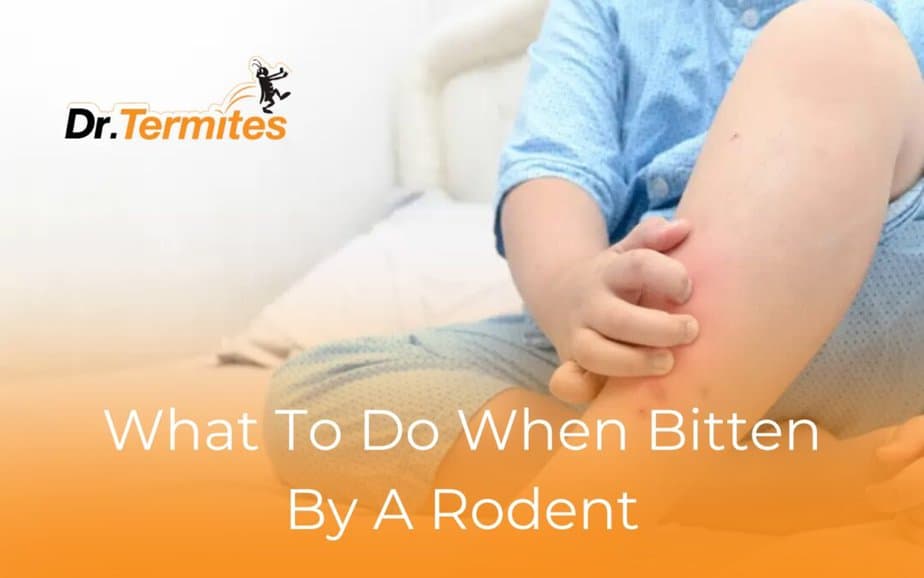
by pestcontrolseos | Jan 7, 2025 | Blog, Pest Info & Articles
Though rare, rodent attacks nonetheless cause great concern. Should a rodent bite you, you should respond right away. Illnesses carried by rats, mice, and other rodents might be passed on via bites. Although these bites normally cause little immediate danger, incorrect treatment might cause infections or other health issues. We’ll go over the actions you should take right away after a rodent bite in this post. We’ll also talk about how routine pest control treatments may help stop future occurrences of this kind.
What to Do Right Away Following a Rodent Bite
To reduce the danger of illness, quick response is essential after a rodent bite. The steps you should take are as follows:
Clean it Completely
Clean the bite site first. Wash the cut right away with fresh water and soap. This helps the rodent eliminate any debris or pathogens that could have entered. Use lukewarm water and a mild soap. To stop further harm, don’t scrape the area too hard.
Disinfect the Bite
After cleansing the cut, sanitize the surrounding area with an antiseptic. This reduces the chance of infection and maintains the incision clean all through the healing process. The bite might be treated right away with an antiseptic solution using iodine or hydrogen peroxide. Make sure the antiseptic can safely heal open wounds.
Put Pressure on the Wound to Stop Bleeding
Use a fresh towel or gauze pad to gently push on any bleeding from the bite. Until the bleeding stops, keep it there. Although most rat bites don’t result in significant bleeding, it’s crucial to stop any bleeding very once to prevent consequences.
Cover the Injury
Apply a sterile bandage to the wound when the bleeding has stopped and the area has been cleaned. By doing this, the region is shielded from dirt and further infections. At least once a day, or more often if it becomes damp or soiled, replace the bandage.
Seek Medical Attention
While many rodent bites heal on their own, sometimes you should consult a doctor. Should the bite get red or swollen, or if you have fever or discomfort, these might point to an infection. If you haven’t received a tetanus shot in the last ten years or if the rodent involved was being abnormally hostile or unwell, you should also see a healthcare provider.
Infection Symptoms to Look Out for
Some symptoms may not show up right away, and infections from rodent bites may happen. Watch for any of the following symptoms on the wound:
- Swelling or redness around the bite
- Warmth in the vicinity
- discharge of pus originating from the wound
- Chills or fever
- Enhanced discomfort at the location
Consult a physician immediately if you have any of these symptoms. To stop the illness from spreading, a medical practitioner could recommend antibiotics or take other actions.
How to Prevent Future Rodent Bite Injury
Although quick treatment is crucial, long-term preventative plans should also be given great thought. Homes may become targets for rodent infestations, particularly in colder months when they flee inside. These guidelines can lower your future risk of getting bitten by a rodent:
Seal Your Home’s Entry Points
Rodents may fit through tiny openings or crevices near pipes, doors, and windows. Look for any entrance points in your house and seal them. This entails repairing any holes in the walls or floors and inspecting the vicinity of the points where utility lines enter the property.
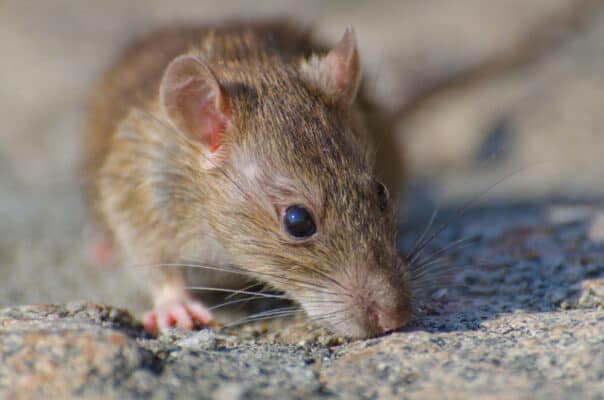
Eliminate Food Sources
Food often attracts rodents. Food should be stored in airtight containers, and spills and crumbs should be cleaned up immediately. Pet food should be stored in sealed containers and not left out overnight. Rodents will find your house less tempting if there is less food available.
Establish Baits and Traps
Use bait or set traps if you’ve seen indications of rodent activity. Set traps in places where rats are likely to go, such attics, under appliances, and along walls. To guarantee the greatest results, get professional rodent control if you’re not sure how to place traps or handle vermin on your own.
Frequent Pest Management to Avoid Infestation
By taking precautions to lessen the possibility that rats will enter your house in the first place, you may minimize rodent attacks. The likelihood of an infestation may be considerably reduced by scheduling regular pest control treatments. A qualified rodent control expert can inspect your house, identify any trouble spots, and put rodent-repelling measures in place. Frequent pest control inspections may provide peace of mind and help avoid future rodent problems.
Prompt Measures and Prolonged Prevention of Rodent Bite Injury
Being bitten by a rodent is not something that many people consider, but it is critical to understand how to address the situation if it occurs. Clean, disinfect, and monitor the wound for symptoms of infection. If necessary, get medical help. To prevent such accidents, seal your house and limit food sources. Regular pest treatment should be the last step in preventing future rodent-related health problems. Staying proactive reduces your chances of meeting rodents and protects you from bites.
Trust Dr. Termites‘ skilled pest control services to shield your house from rodent infestations and bites. Get in touch with us right now for a comprehensive assessment and specialized solutions to maintain the safety and rodent-free status of your house. This is where your tranquility begins!
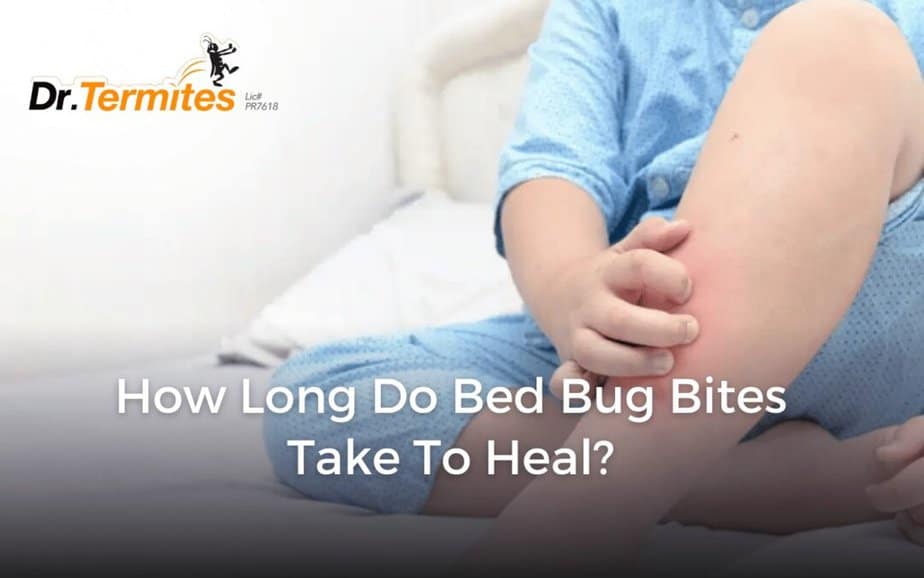
by pestcontrolseos | Dec 27, 2024 | Blog, Pest Info & Articles
Bite marks from bed bugs are usually quite painful and annoying. Although these small insects are known to leave red, itchy bite marks, the time it takes for bites to heal can differ from one individual to the next. A bite’s severity, your skin’s reaction, and your treatment all play a role in how long it takes for the bite to heal. What follows is a discussion of the usual duration for bed bug bites to heal, along with suggestions for hastening the process and avoiding future bites.

Aspects Affecting Healing Bed Bug Bite Time
The length of time bed bug bites take to heal depends on your immune system, bite count, and handling of them.
- Your Body’s Immune Reaction
When a bed bug bites, their saliva sets off a skin reaction. The immune system in your body reacts by producing histamine, which causes swelling and itching. The degree of the response differs. While some may have mild swelling, others might get more significant, irritated welts.
- The Nature of the Bites
Healing could take more time if you are bitten several times or if the bites last for longer. While smaller bites might heal in a few days to a week, larger welts may take several weeks to heal.
- Scratching and Infection
Scratching the bites might break the skin and cause infection, so hindering the healing process. Should an infection strike, medical intervention could be required to hasten healing.
How Long Does Healing Take from Bed Bug Bites?
Bed bug bites typically take one to two weeks to heal totally. Still, this might change depending on the above mentioned factors. While some bites go away in a few days, others could take more time, particularly if the skin gets infected. Though the itching and swelling usually go away in a few days, the marks left by the bites could last several weeks.
How to Attend to Bed Bug Bites for Faster Healing
Though bed bug bites can be unpleasant, there are several actions you can do to treat them and encourage faster healing.
- Clean the area
Wash the afflicted area with soap and water as soon as you spot the bites to lower your risk of infection. This can help eliminate any germs from the skin and somewhat ease itching.
- Apply Ointments or Anti-Itch Creams
Over-the-counter anti-itch creams including calamine lotion or hydrocortisone can help ease itching and swelling. Using these creams helps the bites heal more comfortably.
- Take an antihistamine.
Oral antihistamines can help to ease itching and stop the reaction from aggravating. These can be bought over-counter and help to reduce the irritation brought on by bed bug bites.
- Avoid Scratching
Although it can be tempting to scratch the bites, doing so runs the danger of breaking the skin and causing infection. Should you struggle to resist, think about bandaging the bites to stop more irritation.
- Use a cold compress
Instant relief from the discomfort comes from a cold compress helping to numb the area and ease swelling. Just wrap some ice in a cloth and spend roughly ten to fifteen minutes, at a time, on the afflicted area.
When Should One See a Doctor?
- Most usually, bed bug bites heal on their own without any problems. If the bites seem to be infected (redness, warmth, or pus), you should visit a doctor though.
- You have a severe allergic reaction, maybe including swelling of the face or trouble breathing.
- The bites neither seem to get better or worse with time.
- See a medical professional if you are unsure about the degree of your reaction.
Stopping Bites from Bedbugs
Start by routinely looking for bed bug indicators in your house, particularly in areas like furniture and bed frames, to prevent bites. See a qualified professional bed bug control company if you believe an infestation exists.
Check hotel rooms also when traveling since bed bugs can ride in bags. Maintaining a clean home and sealing furniture and wall cracks will help stop bed bugs from getting in.
A Guide on Healing from Bed Bug Bites and Stopping Future Bites
Although they can be quite uncomfortable, bed bug bites typically heal in a few of weeks with correct treatment. Avoiding scratching, cleaning the bites, and applying anti-itch treatments will help speed healing. You should see a doctor whether the bites turn infected or if you have an allergic reaction. Preventing future bed bug encounters and shielding yourself from these irritating bites depends on taking action now.
]Dr. Termites will assist you to safeguard your health and residence. Our experienced staff provides fast, reliable approaches of bed bug prevention and treatment. Let bedbugs compromise your comfort; see Dr. Termites right now for effective, long-lasting results. Once more, sleep softly!

by pestcontrolseos | Dec 22, 2024 | Blog, Pest Info & Articles
As a safe and efficient natural pest management method, orange oil has grown in popularity. It is derived from orange peels and includes d-limonene, a potent active component that effectively eradicates pests. Orange oil treatment has quickly gained popularity among homeowners looking to maintain their premises pest-free due to its non-toxic and environmentally favorable qualities. Let’s look at how to apply orange oil to different areas of your house to keep it safe and pest-free.

How Orange Oil Works in Pest Control
Orange oil works by targeting the systems of pests directly. Insects are eliminated as a result of its d-limonene component dissolving their outer coats. Because it doesn’t utilize dangerous chemicals as conventional pest control methods do, it’s safer to use in homes. This makes orange oil especially effective for treating specific pest problems in localized areas.
Why Choose Orange Oil?
- Eco-Friendly: It is a sustainable alternative that lessens dependency on artificial pesticides because it is made from orange peels.
- Safe Around Kids and Pets: Because orange oil is non-toxic, it can be used in places where kids or pets are present.
- Wide Range of Applications: In addition to termites, it works effectively for other pest issues including ant infestation.
Applications of Orange Oil in the Home
1. Wooden Furniture and Structures
Your home’s wooden surfaces, including flooring, beams, and furniture, are frequently susceptible to termite infestations. In order to combat termite activity in these places without having to disassemble or remove wood, orange oil is frequently used.
How to Apply Orange Oil to Wooden Areas
- Look for obvious termite damage, small holes, or hollow noises in the wood.
- To enable the oil to deeply permeate the wood where termites live, drill tiny holes in the afflicted region.
- Inject orange oil into these holes using a syringe or applicator.
This process targets the colony directly, eliminating termites while keeping the wood intact. Regular inspections and applications can help prevent future infestations.
2. Baseboards and Wall Cracks
Baseboards and wall crevices are common entry points for pests. Applying orange oil here helps seal off these areas from pests and prevents further infestations.
Steps to Treat Baseboards and Walls
- Use a spray bottle filled with orange oil or a diluted mixture of it.
- Spray along the edges of baseboards and any visible cracks in walls.
- Pay attention to locations where you have seen bug droppings or trails.
Orange oil’s zesty perfume not only serves as a repellant but also infuses your house with a revitalizing scent.
3. Kitchen and Pantry
Given the presence of food and water, the kitchen is among the most pest-prone spaces. Pests like cockroaches and ants frequently enter these areas. Orange oil is a natural and healthy way to protect sensitive regions.
Using Orange Oil in the Kitchen
- To make a cleaning solution, combine a few drops of orange oil with water.
- To keep bugs away, mist cupboards, shelves, and countertops with the solution.
- Particular care should be paid to locations where pests prefer to congregate, such as food storage spaces, garbage disposals, and sink drains.
This technique guarantees that your kitchen surfaces stay chemical-free and clean while also keeping pests away.
4. Outdoor Wooden Structures and Spaces
Termites and other pests can infiltrate outside spaces such as patios, fences, and garden furniture in addition to the interior of your house. Orange oil is an excellent treatment for protecting these structures from pests.
How to Use Orange Oil Outdoors
- Directly apply orange oil on deck surfaces, fences, and wooden patio furniture.
- To deter pests, spray near trash cans, compost piles, and outside cracks.
Frequent application establishes a barrier of defense, keeping pests out of your outdoor areas.
5. Floors and Carpets
Although not their first target, some pests like ants and fleas may invade floors and carpets. To get rid of bugs and keep them away, apply orange oil to these places.
Steps for Floors and Carpets
- In a spray bottle, combine a tiny bit of orange oil with water.
- After lightly misting the impacted areas, let them dry.
- Sprinkle baking soda and a few drops of orange oil over carpets, let them sit for a bit, and then give them a good vacuuming.
This approach helps maintain a pest-free floor area while keeping the air fresh.
Benefits of Orange Oil for Your Home
Orange oil is highly effective and offers multiple benefits:
- Localized Treatment: It may be applied exactly where it’s needed, which lowers the possibility of overuse.
- Natural and Safe: It is a safer option for your house because no dangerous residues are left behind.
- Pleasant Scent: In contrast to conventional insecticides, orange oil leaves behind a pleasant, natural citrus scent.
Orange Oil Applications to Protect Your Home from Pests
Orange oil is a natural, safe, and adaptable way to get rid of pests in your house. Its application is simple and efficient, whether you’re battling termites in your hardwood furniture, ants in the kitchen, or safeguarding your outdoor areas. Orange oil treatment is a wise option for homeowners who wish to repel pests without using harsh chemicals because of its eco-friendly qualities and attractive aroma. Make use of it to make your house safer, cleaner, and pest-free.
Choose Dr. Termites for natural, effective pest control solutions! Our orange oil treatments are tough on pests and safe for your family. Call now for a home free from termites and ants!
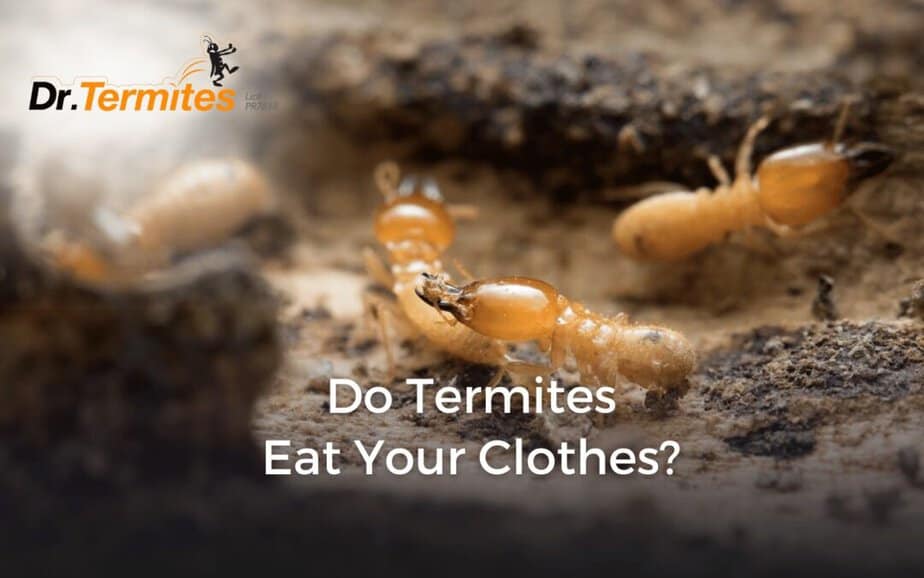
by pestcontrolseos | Dec 13, 2024 | Blog, Pest Info & Articles
Termites are primarily known for causing damage to wood and other cellulose-based materials. Many homeowners wonder if these pests can also eat their clothes. While termites mainly feed on wood, there are some important things to understand about how they interact with your belongings. In this post, we’ll clarify whether termites are a threat to your clothes and how you can protect your home from potential damage.

Can Termites Eat Clothes?
Termites don’t typically eat clothes, but there are exceptions. These pests feed primarily on cellulose found in wood, paper, and some fabrics. Most common clothing materials, like cotton, wool, and synthetics, don’t contain enough cellulose to be attractive to termites. However, natural fibers like silk or linen may contain small amounts of cellulose, potentially drawing termites in if they are stored near wooded areas where termites are active.
Why Don’t Termites Eat Most Clothes?
Termites primarily feed on cellulose-rich materials like wood and paper. Common clothing materials like polyester, nylon, and acrylic are synthetic and contain little to no cellulose. As a result, these fabrics are not a food source for termites. While natural fibers may contain small amounts of cellulose, termites are unlikely to target them unless they are stored near heavily infested wooden areas.
What Do Termites Eat?
Termites are specialized insects that consume cellulose, a complex carbohydrate found in plant-based materials. Their digestive systems are equipped with microorganisms that help break down cellulose into simpler sugars. Wood, paper, and cardboard are their main food sources, but certain fabrics made from natural materials may also attract them under the right conditions.
Do Termites Affect Synthetic Fabrics?
Synthetic fabrics like polyester, nylon, and acrylic do not contain cellulose, so termites will not be attracted to them. However, termite damage to wooden structures in your home could lead to moisture issues, and that moisture could indirectly damage clothing. For instance, water leaks or mold caused by termites can affect your fabrics, even if termites themselves don’t directly target your clothes.
How Can Termites Harm Your Property?
While termites may not directly eat your clothes, they can still cause significant damage to your property. Termites feed on wood, weakening the structural integrity of your home. In severe infestations, termites can cause extensive damage to walls, floors, and furniture. Termite damage can lead to weakened beams, ceilings, and support structures, which can indirectly affect your belongings.
Moisture and Mold Risks
When termites consume wood, they often introduce moisture into the environment, creating conditions where mold can thrive. Mold can spread quickly onto clothing, causing discoloration, odors, and fabric damage. This means that while termites may not target clothes directly, their presence can still lead to conditions that harm your belongings.
How to Protect Your Clothes From Termites?
While termites are unlikely to eat your clothes, it’s still important to take steps to protect your belongings. Preventing termite damage involves addressing moisture issues and keeping your home free of termites.
Store Clothes Properly
Store clothes made from natural fibers, like wool or silk, in sealed plastic bins or garment bags. This can help protect them from exposure to termites, especially if your home is susceptible to infestations. Keep your clothes in areas that are not near wooden structures or attics and basements where termites are more likely to be active.
Regular Inspections
Regular inspections of your home are key to preventing termite infestations. If you notice any signs of termites, such as mud tubes or wood that sounds hollow when tapped, contact a professional termite control service to address the problem. Early detection can prevent costly damage to both your property and your belongings.
Address Moisture Issues
Termites are attracted to moisture, so fixing leaks and maintaining proper ventilation can reduce the chances of an infestation. Check for signs of water damage in your home, especially in areas like the basement or attic, where termites are commonly found. Keep these areas dry to discourage termites from taking up residence.
When Termites Target More Than Just Wood in Your Home
Termites are not likely to eat your clothes, but they can still cause damage to your home that affects your belongings. Their primary food source is wood, but the moisture they introduce can create an environment that’s harmful to fabrics. By properly storing clothes, fixing moisture issues, and having regular inspections, you can protect both your home and your belongings from the effects of termites. Taking these simple steps can help you avoid costly repairs and ensure your clothes stay safe.
If you suspect a termite problem in your home, don’t wait until it’s too late. Contact Dr. Termites today for a thorough inspection and expert termite control services. Our professional team will protect your property and belongings from costly termite damage. Call us now for peace of mind!









































